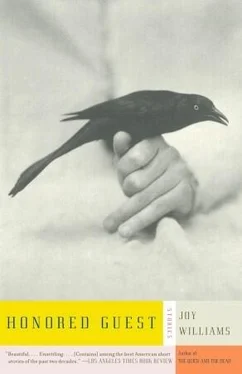“I have to go, Mom,” Helen said.
“You do, of course you do,” her mother said. She patted Helen’s cheeks clumsily. “You’re so hot, you’re sick.”
“I love you,” Helen said.
“I love you too,” Lenore said. Then she watched her walk down the street toward the corner. The day was growing lighter. The mornings kept coming, she didn’t like it.
On the bus, the driver said to Helen, “I lost my mother when I was your age. You’ve just got to hang in there.”
Helen walked toward the rear of the bus and sat down. She shut her eyes. A girl behind her snapped her gum and said, “‘Hang in there.’ What an idiot.”
The bus pounded down the snow-packed streets.
The girl with the gum had been the one who told Helen how ashes came back. Her uncle had died and his ashes had come in a red shellacked box. It looked cheap but it had cost fifty-five dollars and there was an envelope taped to the box with his name typed on it beneath a glassine window as though he was being addressed to himself. This girl considered herself to be somewhat of an authority on the way these things were handled, for she had also lost a couple of godparents and knew how things were done as far south as Boston.
MIRIAM WAS LIVINGwith a man named Jack Dewayne who taught a course in forensic anthropology at the state’s university. It was the only program in the country that offered a certificate in forensic anthropology, as far as anyone knew, and his students adored him. They called themselves Deweenies and wore skull-and-crossbones T-shirts to class. People were mad for Jack in this town. Once, in a grocery store, when Miriam stood gazing into a bin of little limes, a woman came up to her and said, “Your Jack is a wonderful, wonderful man.”
“Oh, thanks,” Miriam said.
“My son Ricky disappeared four years ago and some skeletal remains were found at the beginning of this year. Scattered, broken, lots of bones missing, not much to go on, a real jumble. The officials told me they probably weren’t Ricky’s but your Jack told me they were, and with compassion he showed me how he reached that conclusion.” The woman waited. In her cart was a big bag of birdseed and a bottle of vodka. “If it weren’t for Jack, my Ricky’s body would probably be unnamed still,” she said.
“Well, thank you very much,” Miriam said.
She never knew what to say to Jack’s fans. As for them, they didn’t understand Miriam at all. Why her of all people? With his hunger for life, Jack could have chosen better, they felt. Miriam lacked charm, they felt. She was gloomy. Even Jack found her gloomy occasionally.
Mornings, out in the garden, she would, at times, read aloud from one of her many overdue library books. Dew as radiant as angel spit glittered on the petals of Jack’s roses. Jack was quite the gardener. Miriam thought she knew why he particularly favored roses. The inside of a rose does not at all correspond to its exterior beauty. If one tears off all the petals of the corolla, all that remains is a sordid-looking tuft. Roses would be right up Jack’s alley, all right.
“Here’s something for you, Jack,” Miriam said. “You’ll appreciate this. Beckett described tears as ‘liquefied brain.’”
“God, Miriam,” Jack said. “Why are you sharing that with me? Look at this day, it’s a beautiful day! Stop pumping out the cesspit! Leave the cesspit alone!”
Then the phone would ring and Jack would begin his daily business of reconstructing the previous lives of hair and teeth when they had been possessed by someone. A detective a thousand miles away would send him a box of pitted bones and within days Jack would be saying, “This is a white male between the ages of twenty-five and thirty who didn’t do drugs and who was tall, healthy and trusting. Too trusting, clearly.”
Or a hand would be found in the stomach of a shark hauled up by a party boat off the Gulf coast of Florida and Jack would be flown off to examine it. He would return deeply tanned and refreshed, with a crisp new haircut, saying, “The shark was most certainly attracted to the rings on this hand. This is a teen’s hand. She was small, perhaps even a legal midget, and well nourished. She was a loner, adventurous, not well educated and probably unemployed. Odds are the rings were stolen. She would certainly have done herself a favor by passing up the temptation of those rings.”
Miriam hated it when Jack was judgmental and Jack was judgmental a great deal. She herself stole on occasion, mostly sheets. For some reason, it was easy to steal sheets. As a girl she had wanted to become a witty, lively and irresistible woman, skilled in repartee and in arguments on controversial subjects, but it hadn’t turned out that way. She had become a woman who was still waiting for her calling.
Jack had no idea that Miriam stole sheets and more. He liked Miriam. He liked her bones. She had fine bones and he loved tracing them at night beneath her warm, smooth skin, her jawbone, collarbone, pelvic bone. It wasn’t anything that consumed him, but he just liked her was all, usually. And he liked his work. He liked wrapping things up and dealing with those whom the missing had left behind. He was neither doctor nor priest; he was the forensic anthropologist, and he alone could give these people peace. They wanted to know, they had to know. Was that tibia in the swamp Denny’s? Denny, we long to claim you … Were those little bits and pieces they got when they dragged the lake Lucile’s even though she was supposed to be in Manhattan? She had told us she was going to be in Manhattan, there was never any talk about a lake … Bill had gone on a day hike years ago with his little white dog and now something had been found, found in a ravine at last… Pookie had toddled away from the Airstream on the Fourth of July just as we were setting up the grill, she would be so much older now, a little girl instead of a baby, and it would be so good just to know, if we could only know …
And Jack would give them his gift. He could give them the incontrovertible and almost unspeakable news. That’s her, that’s them. No need to worry anymore, it is finished, you are free. No one could help these people who were weary of waiting and sick of hope like Jack could.
Miriam had a fondness for people who vanished, though she had never known any personally. But if she had a loved one who vanished, she would prefer to believe that they had fallen in love with distance, a great distance. She certainly wouldn’t long to be told they were dead.
One day, one of Jack’s students, an ardent hunter, a gangly blue-eyed boy named Carl who wore camouflage pants and a black shirt winter and summer, presented him with four cured deer feet. “I thought you’d like to make a lamp,” Carl said.
Miriam was in the garden. She had taken to stealing distressed plants from nurseries and people’s yards and planting them in an unused corner of the lot, far from Jack’s roses. They remained distressed, however — in shock, she felt.
“It would make a nice lamp,” Carl said. “You can make all kinds of things. With a big buck’s forelegs you can make an outdoor thermometer. Looks good with snowflakes on it.”
“A lamp,” Jack said. He appeared delighted. Jack got along well with his students. He didn’t sleep with the girls and he treated the boys as equals. He put his hands around the tops of the deer feet and splayed them out some.
“You might want to fiddle around with the height,” Carl said. “You can make great stuff with antlers, too. Chandeliers, candelabras. You can use antlers to frame just about anything.”
“We have lamps,” Miriam said. She was holding a wan perennial she had liberated from a supermarket.
Читать дальше












